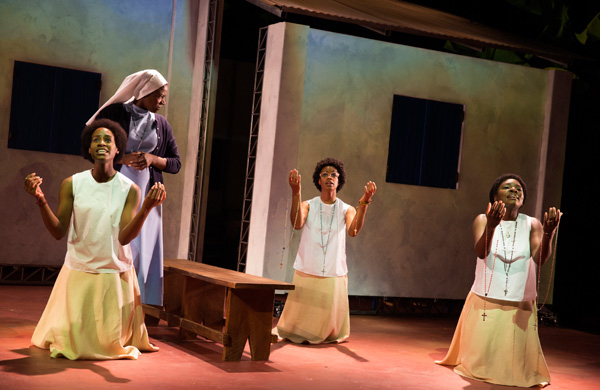Our Lady of Kibeho

(© Joan Marcus)
Doubting Thomases will have to work extra hard to unpack and explain away the events of Our Lady of Kibeho, a world premiere play by Katori Hall (Hurt Village) at Signature Theatre. The author doesn't do any of the heavy lifting for you…and that's a good thing. Hall's brilliant play, a simultaneously straightforward yet clear-eyed presentation of a recent bit of Catholic mysticism, leaves you grasping for answers and straining for connections days after the final blackout.
The play is based on the true story of three Rwandan girls who, in 1982, claimed to see and speak with the Virgin Mary. These "Marian apparitions" have since received Vatican approval. Many view them as a prescient warning about the 1994 Rwandan genocide that resulted in the murder of nearly 1,000,000 people.
Scenic designer Rachel Hauck uses the full breadth of the stage to lavishly create the Catholic girls school where the apparitions take place, a cluster of little stucco houses with bright blue doors. They unfold like dollhouses as the scenes require.
The story begins in one such house, the office of the school's head priest, Father Tuyishime (Owiso Odera). He's having a heated discussion with head nun Sister Evangelique (Starla Benford) about one of the students, Alphonsine (Nneka Okafor). Alphonsine claims to have been visited by the Virgin Mary. Evangelique thinks she's a blasphemous liar, but Tuyishime is not so sure. They bicker like they're in a Rwandan production of Doubt until Tuyishime pulls rank with Sister Evangelique (men always trump women in the church) and decides to handle Alphonsine's punishment himself.
Yet when the apparitions spread to another girl, Anathalie (Mandi Masden), Evangelique takes matters into her own hands and encourages the school bully, Marie-Claire (Joaquina Kalukango) to go after the two Tutsi visionaries. Marie-Claire whips the mostly Hutu students into a frenzy against them. (Ethnic tension between the Hutu and Tutsi tribes, the source of the 1994 genocide, underscores the events of the play.) Amazingly, however, even Marie-Claire succumbs to Mary's irresistible charm in a first-act finale that is more exciting and frenetic than most musicals on Broadway.
Okafor, Masden, and Kalukango give staggering performances during their trancelike visitations, complete with zombielike prayer, writhing, and speaking in tongues. As the hard-as-nails head nun, Benford champions our disbelief until the author makes her doubt untenable. Even after that, Odera compellingly embodies a far more complicated angst: not wanting to believe, in spite of all the evidence. The prophecy the girls bear is just too terrible to get behind. "Is it so easy to believe visions of violence when they fall from African lips?" Tuyishime incredulously asks Father Flavia (T. Ryder Smith), a visiting emissary from the Vatican.
Flavia has come to investigate the validity of the visions. "I should have been a lawyer," the professional skeptic muses before embarking on a series of gruesome medical examinations and grueling tests of faith. He's there to make sure that everything the girls do and say is in compliance with Catholic doctrine, very much like an intellectual property attorney advocating for his brand.
It's only in relation to this proprietary attitude toward faith that the specter of doubt creeps into the play. Alphonsine rejects two central tenets of Catholic belief: the trinity (one God, three persons) and transubstantiation (the belief that bread and wine actually become the body and blood of Christ during Holy Communion). Flavia wonders why the blessed mother would choose such an ignorant vessel for her message. In light of that, Bishop Gahamanyi (a distressingly pompous and cynical Brent Jennings) pressures Father Tuyishime to coach her on basic Catholicism, reasoning that if her visions are confirmed by the Vatican, Kibeho stands to cash in big from the flood of pilgrims buying Catholic merchandise.
And flood they do. Under the energetic direction of Michael Greif, a cast of thousands (or so it seems) create a biblical tone during the girls' public appearances, full of violence and confusion. Greif stages these scenes in the aisle dividing the audience, making us feel like we're in an immersive DeMille epic. "Nobody wants to see the Bishop," a member of the rabble shouts as the prelate drones on. "I want to hear the visionaries." As these fervent masses turn away from the conventional church and toward their new prophets, you can almost sense Edward G. Robinson egging them on from behind.
And like DeMille, Greif offers up plenty of fire and brimstone. Ben Stanton (lights) and Matt Tierney (sound) create an epic onstage storm, including wind blowing through our hair. Projection designer Peter Nigrini flashes terrifying visions of death and destruction across the stage as the girls recite their apocalyptic prophecy.
Committed skeptics will dismiss the whole thing as well-informed intuition. (In an environment steeped in tribal animosity, is it really that remarkable to predict the hills will "run red with blood"?) Yet Hall wisely refuses to let her audience leave the theater wearing a grin of smug satisfaction. Just when you think you have it all figured out, you remember a scene or encounter that calls your version of the truth into question. Our Lady of Kibeho is the rare play that leaves the faithful questioning their faith and the doubtful questioning their doubt.











